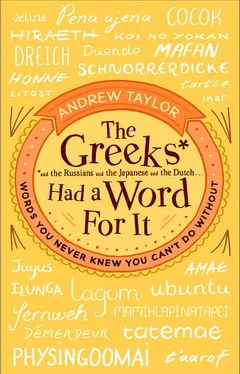Tartle originally meant to hesitate nervously, whether in meeting someone, failing to reach a business deal, or simply backing away from anything unusual, as a horse might. From that, it has developed to refer specifically to that horrifying moment when you are halfway through an introduction and forget the name of the person you are introducing. Perhaps you may remember only their first name, perhaps only their second, perhaps only a nickname, but whichever it is you are caught with a stupid smile on your face and nothing coming out of your mouth except a stream of unedifying ers and umms. You are tartling .
The word can be either a verb – ‘I was just introducing her when I tartled ’ – or a noun – ‘Please forgive my tartle .’ Either way, it’s a light-hearted and jovial way of describing an excruciating social moment.
If we are going to incorporate tartle into the English language, there’s no reason why we should restrict the definition to the specific meaning that the Scots have given it. As we get older, many of us succumb to what we like to call ‘senior moments’ – we start to talk about a certain film star, singer or politician and find halfway through the sentence that we’ve forgotten their name. We say, incautiously, that there are three reasons for something and then start to list them – knowing, deep down in our soul, that after the second one our mind will go blank. We go into a room and then stand there bemused for a few seconds while we try to remember what we came in for.
All of these moments are different forms of tartles . If we could name them with a word a little more dignified than the twee ‘senior moment’, perhaps we would find them easier to face. If you’re under thirty and can’t see why on earth we would need a word like tartle , just wait a few years.
Behaving in an endearingly helpless way that encourages other people to want to take care of you
So you’re in your thirties – successful and making a name for yourself in your career. People at work want to know your opinion. When you say something, they listen. You are a pretty big cheese, although you would never say so yourself.
But when you travel home to see your parents, you expect the special dinner you always enjoyed as a child – and you’ll let your mother see how disappointed you are if it’s not on the table. You want to sleep in your own room, where the books that saw you through adolescence are still on the shelves. If you think you can get away with it, perhaps you’ll take your washing home – and of course you can get away with it because your mother will not only wash it but also iron it, fold it and put it carefully back in your overnight bag for you.
You are suffering from a serious dose of amae .
Amae ( ahm-EYE ) is a Japanese word popularized by the psychoanalyst Takeo Doi in his book The Anatomy of Dependence , which was published in Japan in the 1970s. It describes a type of behaviour which he claimed was particularly prevalent among the Japanese but which many Westerners will recognize in their friends. Some may also see it in themselves and feel a little embarrassed about it, but it’s a word that’s normally applied to other people. It refers to a tendency to curry favour or induce affection by behaving in a way that encourages other people to take care of you, and its commonest form is to continue to act like a child in dealings with your parents. Such as demanding your special meal or taking your washing home.
The parent–child relationship is for many people a model for the way they behave throughout their lives, but it’s not the only place where amae shows itself. There are all sorts of ways in which people carry out amae in their working lives and in their wider personal relations. Usually it appears in a relationship between someone junior and someone senior in the workplace, or between someone younger and someone older in a social setting.
But that’s not always the case. Often, it shows itself in a claimed weakness or incapacity – the woman who ‘can’t’ change a wheel on her car and waits helplessly for some man to step forward and do it for her; the man who holds up his crumpled shirt with what he hopes is an appealing smile and simpers to the woman in his life that he ‘doesn’t know how’ to use an iron. It’s not just that they want the job done but also that they want to be loved for their helplessness. They are the walking, talking human manifestation of the famous heart-rending, head-on-one-side, big-eyed gaze of an Andrex puppy – and often they make you want to give them a good, hard kick.
But that’s a very negative view, and there is a positive side to amae , too, especially as practised in Japan. Doi’s theory was that Japanese society never completely abandons the dependent phase of childhood, so that amae is reflected in the strictly hierarchical structure of many companies. It may take longer to establish a close business relationship, but once it’s achieved it’s likely to be marked by trust on both sides and a sense of personal responsibility. And it’s not just a one-way relationship.
The junior Japanese executive may profit from the advice and experience of his senior, while the older exec enjoys the respect and deference he receives and feels he deserves; the young woman in her car has her wheel changed for her, and the man who does it gets an agreeable if rather patronizing feeling of superiority.
The young woman visiting her parents, meanwhile, gets a tasty meal and a bag of freshly laundered washing. But if she steps too far out of line and demands too much, she’s not too old to end up on the naughty step.
The anxious and irresistible need to check whether who, or what, you’re waiting for has arrived yet
It can manifest itself in different ways.
Perhaps it’s waiting for a girlfriend to arrive – just aching to see her, anticipating the arrival of the person who might turn out to be the love of your life and turn your world upside down. You start glancing at the clock about an hour before the time you’ve arranged. Then you check that everything is ready – that the table is laid or the glasses are out ready to pour your first drink. And then – still ages before she is due – you peep out of the window to see if she might have arrived early. And finally you actually go outside and peer up the road to see if she is on her way.
Or perhaps, more prosaically, it’s standing in a bus shelter, craning your neck for the umpteenth time to see if the bus has turned the corner yet.
It’s not only about anxiety – you can feel the same mounting tension even if you know for certain that the person is going to come or if you haven’t got an urgent appointment that you’re going to miss if the bus is late. There’s a positive feeling of excited anticipation – you want the excitement of seeing whatever it is you’re waiting for as soon as you possibly can. Even so, you’ll only be absolutely certain they haven’t let you down once you see the person in the flesh or the bus in the road, so the little niggle of unease is there.
Whether it’s a bus or the love of your life, it doesn’t make sense – when they get here you’ll know, and they won’t arrive any more quickly because you keep leaping out of your chair or peering anxiously down the road. But you just can’t help yourself.
The Inuit of northern Canada have a word for it – iktsuarpok ( ITT-suar-POHK ) – which catches precisely that excitement and the physical activity that goes with it. It’s usually translated as ‘the feeling of anticipation when you’re expecting a visitor’, but, crucially, it also contains the sense that you try to ease the tension by getting up and going out to see if they are coming.
Читать дальше












